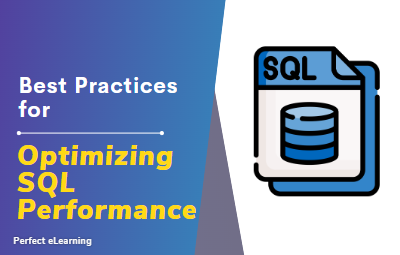

SQL, or Structured Query Language, is one of the most widely used programming languages for managing relational databases. It is used to create, modify, and query databases, and is critical to the performance of many applications. SQL performance is a critical issue for many organizations, as slow database performance can lead to lost productivity, lost revenue, and even lost customers. In this article, we will discuss some best practices for optimizing SQL performance, including indexing, query optimization, and server tuning.
Understanding SQL Performance
Before we dive into best practices for optimizing SQL performance, it is important to understand how SQL performance works. SQL performance is influenced by a variety of factors, including the design of the database schema, the number of records in the database, the complexity of the queries being run, and the hardware on which the database server is running. In general, optimizing SQL performance involves finding ways to minimize the amount of time it takes to retrieve data from the database.
Best Practices for Optimizing SQL Performance
1. Indexing: One of the most important factors in SQL performance is indexing. Indexes allow the database to find data more quickly by creating a map of the data in the database. By creating indexes on the most commonly queried columns in the database, you can dramatically improve query performance. It is important to note, however, that creating too many indexes can actually slow down performance, as the database has to maintain the index data in addition to the actual data.
2. Query Optimization: Another key factor in SQL performance is query optimization. This involves finding ways to write queries that are more efficient and take less time to execute. This can involve using more specific WHERE clauses to limit the amount of data that needs to be retrieved, or breaking complex queries down into simpler, more manageable parts.
3. Server Tuning: Server tuning is also an important factor in SQL performance. This involves optimizing the hardware and software on which the database server is running. This can involve adding more RAM to the server, using solid-state drives instead of traditional hard drives, or adjusting the configuration settings of the database software itself.
4. Normalization: Normalization is a process in which the database schema is designed to minimize redundancy and improve data consistency. This can help to improve SQL performance by reducing the amount of data that needs to be retrieved and processed by the database.
5. Use Stored Procedures: Stored procedures are pre-compiled code that can be executed by the database server. By using stored procedures instead of ad-hoc queries, you can improve SQL performance by reducing the amount of time it takes to compile and execute queries.
6. Optimize Database Design: The design of the database schema can also have a significant impact on SQL performance. By designing the database schema with performance in mind, you can reduce the amount of time it takes to retrieve data from the database.
7. Monitor Performance: Finally, it is important to monitor SQL performance on an ongoing basis. By monitoring performance metrics such as query execution time and server load, you can identify potential issues before they become major problems.
Conclusion
Optimizing SQL performance is critical for the success of many applications. By following these best practices for indexing, query optimization, server tuning, normalization, using stored procedures, optimizing database design, and monitoring performance, you can improve SQL performance and ensure that your applications are running as efficiently as possible.
FREQUENTLY ASKED QUESTIONS (FAQs)
Q.What is SQL performance optimization?
A. SQL performance optimization involves finding ways to minimize the amount of time it takes to retrieve data from a database.
Q.What are some best practices for optimizing SQL performance?
A. design, and monitoring performance.
Q.How can indexing improve SQL performance?
A. Indexing can improve SQL performance by creating a map of the data in the database and allowing the database to find data more quickly.
Q.What is query optimization?
A. Query optimization involves finding ways to write queries that are more efficient and take less time to execute.
Perfect eLearning is a tech-enabled education platform that provides IT courses with 100% Internship and Placement support. Perfect eLearning provides both Online classes and Offline classes only in Faridabad.
It provides a wide range of courses in areas such as Artificial Intelligence, Cloud Computing, Data Science, Digital Marketing, Full Stack Web Development, Block Chain, Data Analytics, and Mobile Application Development. Perfect eLearning, with its cutting-edge technology and expert instructors from Adobe, Microsoft, PWC, Google, Amazon, Flipkart, Nestle and Info edge is the perfect place to start your IT education.
Perfect eLearning provides the training and support you need to succeed in today's fast-paced and constantly evolving tech industry, whether you're just starting out or looking to expand your skill set.
There's something here for everyone. Perfect eLearning provides the best online courses as well as complete internship and placement assistance.
Keep Learning, Keep Growing.
If you are confused and need Guidance over choosing the right programming language or right career in the tech industry, you can schedule a free counselling session with Perfect eLearning experts.


